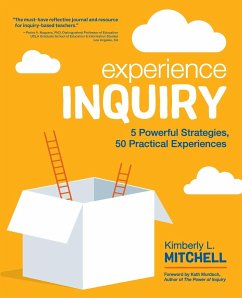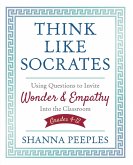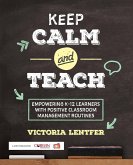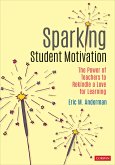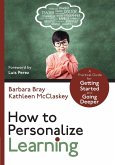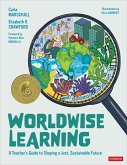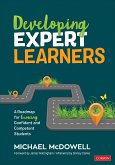- Broschiertes Buch
- Merkliste
- Auf die Merkliste
- Bewerten Bewerten
- Teilen
- Produkt teilen
- Produkterinnerung
- Produkterinnerung
One part practical guide, one part interactive journal, this book shows what inquiry-based instruction looks like in practice through five key strategies, all of which can be immediately implemented in any learning environment.
Andere Kunden interessierten sich auch für
![Think Like Socrates Think Like Socrates]() Shanna PeeplesThink Like Socrates44,99 €
Shanna PeeplesThink Like Socrates44,99 €![Keep CALM and Teach Keep CALM and Teach]() Victoria S. LentferKeep CALM and Teach34,99 €
Victoria S. LentferKeep CALM and Teach34,99 €![Challenging Learning Through Questioning Challenging Learning Through Questioning]() Martin RentonChallenging Learning Through Questioning41,99 €
Martin RentonChallenging Learning Through Questioning41,99 €![Sparking Student Motivation Sparking Student Motivation]() Eric M. Anderman (USA The Ohio State University)Sparking Student Motivation48,99 €
Eric M. Anderman (USA The Ohio State University)Sparking Student Motivation48,99 €![How to Personalize Learning How to Personalize Learning]() Barbara A. BrayHow to Personalize Learning42,99 €
Barbara A. BrayHow to Personalize Learning42,99 €![Worldwise Learning Worldwise Learning]() Carla MarschallWorldwise Learning33,99 €
Carla MarschallWorldwise Learning33,99 €![Developing Expert Learners Developing Expert Learners]() Michael McDowell (Author / Presenter and Co-Owner of Hinge Education)Developing Expert Learners48,99 €
Michael McDowell (Author / Presenter and Co-Owner of Hinge Education)Developing Expert Learners48,99 €-
-
-
One part practical guide, one part interactive journal, this book shows what inquiry-based instruction looks like in practice through five key strategies, all of which can be immediately implemented in any learning environment.
Hinweis: Dieser Artikel kann nur an eine deutsche Lieferadresse ausgeliefert werden.
Hinweis: Dieser Artikel kann nur an eine deutsche Lieferadresse ausgeliefert werden.
Produktdetails
- Produktdetails
- Corwin Teaching Essentials
- Verlag: SAGE Publications Inc
- Seitenzahl: 242
- Erscheinungstermin: 7. September 2018
- Englisch
- Abmessung: 235mm x 191mm x 13mm
- Gewicht: 450g
- ISBN-13: 9781544317120
- ISBN-10: 1544317123
- Artikelnr.: 51515924
- Herstellerkennzeichnung
- Libri GmbH
- Europaallee 1
- 36244 Bad Hersfeld
- gpsr@libri.de
- Corwin Teaching Essentials
- Verlag: SAGE Publications Inc
- Seitenzahl: 242
- Erscheinungstermin: 7. September 2018
- Englisch
- Abmessung: 235mm x 191mm x 13mm
- Gewicht: 450g
- ISBN-13: 9781544317120
- ISBN-10: 1544317123
- Artikelnr.: 51515924
- Herstellerkennzeichnung
- Libri GmbH
- Europaallee 1
- 36244 Bad Hersfeld
- gpsr@libri.de
Kimberly L. Mitchell teaches at the University of Washington's College of Education and is co-founder of Inquiry Partners, a professional learning organization dedicated to promoting inquiry-based teaching strategies. She received her BA in History and Philosophy from Skidmore College and her MA in Administration and Policy Analysis from Stanford University. She lives in Seattle, WA with her husband (a middle school teacher) and two children.
Foreword
Acknowledgments
About the Author
Introduction
1. What Is Inquiry?
My Own Inquiry Journey
Experience #1: Inquiry Self-Survey
2. Beginning Your Inquiry Journey
How to Use This Book
Tips for Success
What's the Role of Administration?
The Inquiry Leader Self-Reflection Tool
Staff Reflection Survey
The Importance of Balance and Harmony
3. Taking Stock of Your Classroom
Experience #2: How Do You Know If You're "Doing" Inquiry?
Experience #3: What Do Your Students Think?
Experience #4: What Do Others See in Your Classroom?
Experience #5: What's the Student Experience?
Experience #6: What Does All This Tell You?
4. What Does Inquiry Look Like?
The Inquiry Five Strategies
Experience #7: What Are Your Burning Questions About Inquiry?
Experience #8: Who, When, and How Should You Answer Questions?
Experience #9: How Can Questions Be Savored?
Experience #10: What Does Your "Ideal" Class Look Like?
5. Strategy #1: Get Personal
Introduction to Get Personal
Experience #11: Mad-Libs: Who Are You?
Experience #12: Who Were Your Teachers?
Experience #13: What Stories Can You Tell?
Experience #14: How Do You Tell a Story That Sticks to the Soul?
Experience #15: What Does Your Classroom Say About You?
Experience #16: Why Do You Teach?
Experience #17: What Is the Third Space?
Experience #18: Ask Me Anything!
6. Strategy #2: Stay Curious
Introduction to Stay Curious
Experience #19: What's Your Expertise?
Experience #20: What Still Intrigues You?
Experience #21: Who Are Your Teachers Today?
Experience #22: Are You a Luddite or Linkedin?
Experience #23: What Do You Teach?
Experience #24: What Would Your Curriculum of Questions Look Like?
Experience #25: What's Your Teaching Approach?
Experience #26: How Do You Respond to Students?
7. Strategy #3: Ask More, Talk Less
Introduction to Ask More, Talk Less
Experience #27: What's Really Happening in Your Classroom?
Experience #28: Who Is Hiding in Plain Sight?
Experience #29: What Questions Are You Asking?
Experience #30: How Do You Teach With Your Mouth Shut?
Experience #31: How Do You Get Students to Listen to One Another?
Experience #32: How Do You Get Students to Talk Together?
Experience #33: What Are Socratic Seminars, Harkness, and Spider Web
Discussions?
Experience #34: Which Questions Work Best in Inquiry Classrooms?
8. Strategy #4: Encourage Evidence
Introduction to Encourage Evidence
Experience #35: What's the Most Important Question to Ask?
Experience #36: How Do You Get Your Students to Back Up Their Claims?
Experience #37: How Do You Teach "Crap Detection"?
Experience #38: How Do You Provoke Healthy Debates?
Experience #39: How Can You Practice the Evidence-Seeking Process?
9. Strategy #5: Extend Thinking Time
Introduction to Extend Thinking Time
Experience #40: How Do You Get Students to Think More?
Experience #41: How Can You Get Students to Ask More Questions?
Experience #42: How Do You Cede Control Without Losing It Completely?
Experience #43: How Do Inquiry and Mindfulness Connect?
Experience #44: How Can You Support Innovative Student Thinking?
Experience #45: How Do You Start Project-Based, Problem-Based, and
Challenge-Based Learning?
10. Now What?
Experience #46: How Do You Plan for Inquiry?
Experience #47: How Do You Assess Inquiry?
Experience #48: How Do You Make Time for Inquiry?
Experience #49: How Do You Explain Inquiry to Skeptics?
Experience #50: What Does Inquiry Look Like to You?
11. Inquiry Resources
Kimberly's Top Ten Lists
Inquiry Books
Inquiry Videos and Podcasts
Inquiry Organizations
Inquiry Blogs
Appendices
More Reasons to Fall in Love With Inquiry: the Inquiry Five (i5) and
Alignment Documents
The i5 and Common Core State Standards
The i5 and Next Gen Science Standards
The i5 and Danielson Teaching Framework
The i5 and Marzano Framework
The i5 and Approaches to Teaching and Learning (International
Baccalaureate)
The i5 and High Leverage Practice (TeachingWorks, University of Michigan)
Curriculum at-a-Glance (Southern Hemisphere)
References
Index
Acknowledgments
About the Author
Introduction
1. What Is Inquiry?
My Own Inquiry Journey
Experience #1: Inquiry Self-Survey
2. Beginning Your Inquiry Journey
How to Use This Book
Tips for Success
What's the Role of Administration?
The Inquiry Leader Self-Reflection Tool
Staff Reflection Survey
The Importance of Balance and Harmony
3. Taking Stock of Your Classroom
Experience #2: How Do You Know If You're "Doing" Inquiry?
Experience #3: What Do Your Students Think?
Experience #4: What Do Others See in Your Classroom?
Experience #5: What's the Student Experience?
Experience #6: What Does All This Tell You?
4. What Does Inquiry Look Like?
The Inquiry Five Strategies
Experience #7: What Are Your Burning Questions About Inquiry?
Experience #8: Who, When, and How Should You Answer Questions?
Experience #9: How Can Questions Be Savored?
Experience #10: What Does Your "Ideal" Class Look Like?
5. Strategy #1: Get Personal
Introduction to Get Personal
Experience #11: Mad-Libs: Who Are You?
Experience #12: Who Were Your Teachers?
Experience #13: What Stories Can You Tell?
Experience #14: How Do You Tell a Story That Sticks to the Soul?
Experience #15: What Does Your Classroom Say About You?
Experience #16: Why Do You Teach?
Experience #17: What Is the Third Space?
Experience #18: Ask Me Anything!
6. Strategy #2: Stay Curious
Introduction to Stay Curious
Experience #19: What's Your Expertise?
Experience #20: What Still Intrigues You?
Experience #21: Who Are Your Teachers Today?
Experience #22: Are You a Luddite or Linkedin?
Experience #23: What Do You Teach?
Experience #24: What Would Your Curriculum of Questions Look Like?
Experience #25: What's Your Teaching Approach?
Experience #26: How Do You Respond to Students?
7. Strategy #3: Ask More, Talk Less
Introduction to Ask More, Talk Less
Experience #27: What's Really Happening in Your Classroom?
Experience #28: Who Is Hiding in Plain Sight?
Experience #29: What Questions Are You Asking?
Experience #30: How Do You Teach With Your Mouth Shut?
Experience #31: How Do You Get Students to Listen to One Another?
Experience #32: How Do You Get Students to Talk Together?
Experience #33: What Are Socratic Seminars, Harkness, and Spider Web
Discussions?
Experience #34: Which Questions Work Best in Inquiry Classrooms?
8. Strategy #4: Encourage Evidence
Introduction to Encourage Evidence
Experience #35: What's the Most Important Question to Ask?
Experience #36: How Do You Get Your Students to Back Up Their Claims?
Experience #37: How Do You Teach "Crap Detection"?
Experience #38: How Do You Provoke Healthy Debates?
Experience #39: How Can You Practice the Evidence-Seeking Process?
9. Strategy #5: Extend Thinking Time
Introduction to Extend Thinking Time
Experience #40: How Do You Get Students to Think More?
Experience #41: How Can You Get Students to Ask More Questions?
Experience #42: How Do You Cede Control Without Losing It Completely?
Experience #43: How Do Inquiry and Mindfulness Connect?
Experience #44: How Can You Support Innovative Student Thinking?
Experience #45: How Do You Start Project-Based, Problem-Based, and
Challenge-Based Learning?
10. Now What?
Experience #46: How Do You Plan for Inquiry?
Experience #47: How Do You Assess Inquiry?
Experience #48: How Do You Make Time for Inquiry?
Experience #49: How Do You Explain Inquiry to Skeptics?
Experience #50: What Does Inquiry Look Like to You?
11. Inquiry Resources
Kimberly's Top Ten Lists
Inquiry Books
Inquiry Videos and Podcasts
Inquiry Organizations
Inquiry Blogs
Appendices
More Reasons to Fall in Love With Inquiry: the Inquiry Five (i5) and
Alignment Documents
The i5 and Common Core State Standards
The i5 and Next Gen Science Standards
The i5 and Danielson Teaching Framework
The i5 and Marzano Framework
The i5 and Approaches to Teaching and Learning (International
Baccalaureate)
The i5 and High Leverage Practice (TeachingWorks, University of Michigan)
Curriculum at-a-Glance (Southern Hemisphere)
References
Index
Foreword
Acknowledgments
About the Author
Introduction
1. What Is Inquiry?
My Own Inquiry Journey
Experience #1: Inquiry Self-Survey
2. Beginning Your Inquiry Journey
How to Use This Book
Tips for Success
What's the Role of Administration?
The Inquiry Leader Self-Reflection Tool
Staff Reflection Survey
The Importance of Balance and Harmony
3. Taking Stock of Your Classroom
Experience #2: How Do You Know If You're "Doing" Inquiry?
Experience #3: What Do Your Students Think?
Experience #4: What Do Others See in Your Classroom?
Experience #5: What's the Student Experience?
Experience #6: What Does All This Tell You?
4. What Does Inquiry Look Like?
The Inquiry Five Strategies
Experience #7: What Are Your Burning Questions About Inquiry?
Experience #8: Who, When, and How Should You Answer Questions?
Experience #9: How Can Questions Be Savored?
Experience #10: What Does Your "Ideal" Class Look Like?
5. Strategy #1: Get Personal
Introduction to Get Personal
Experience #11: Mad-Libs: Who Are You?
Experience #12: Who Were Your Teachers?
Experience #13: What Stories Can You Tell?
Experience #14: How Do You Tell a Story That Sticks to the Soul?
Experience #15: What Does Your Classroom Say About You?
Experience #16: Why Do You Teach?
Experience #17: What Is the Third Space?
Experience #18: Ask Me Anything!
6. Strategy #2: Stay Curious
Introduction to Stay Curious
Experience #19: What's Your Expertise?
Experience #20: What Still Intrigues You?
Experience #21: Who Are Your Teachers Today?
Experience #22: Are You a Luddite or Linkedin?
Experience #23: What Do You Teach?
Experience #24: What Would Your Curriculum of Questions Look Like?
Experience #25: What's Your Teaching Approach?
Experience #26: How Do You Respond to Students?
7. Strategy #3: Ask More, Talk Less
Introduction to Ask More, Talk Less
Experience #27: What's Really Happening in Your Classroom?
Experience #28: Who Is Hiding in Plain Sight?
Experience #29: What Questions Are You Asking?
Experience #30: How Do You Teach With Your Mouth Shut?
Experience #31: How Do You Get Students to Listen to One Another?
Experience #32: How Do You Get Students to Talk Together?
Experience #33: What Are Socratic Seminars, Harkness, and Spider Web
Discussions?
Experience #34: Which Questions Work Best in Inquiry Classrooms?
8. Strategy #4: Encourage Evidence
Introduction to Encourage Evidence
Experience #35: What's the Most Important Question to Ask?
Experience #36: How Do You Get Your Students to Back Up Their Claims?
Experience #37: How Do You Teach "Crap Detection"?
Experience #38: How Do You Provoke Healthy Debates?
Experience #39: How Can You Practice the Evidence-Seeking Process?
9. Strategy #5: Extend Thinking Time
Introduction to Extend Thinking Time
Experience #40: How Do You Get Students to Think More?
Experience #41: How Can You Get Students to Ask More Questions?
Experience #42: How Do You Cede Control Without Losing It Completely?
Experience #43: How Do Inquiry and Mindfulness Connect?
Experience #44: How Can You Support Innovative Student Thinking?
Experience #45: How Do You Start Project-Based, Problem-Based, and
Challenge-Based Learning?
10. Now What?
Experience #46: How Do You Plan for Inquiry?
Experience #47: How Do You Assess Inquiry?
Experience #48: How Do You Make Time for Inquiry?
Experience #49: How Do You Explain Inquiry to Skeptics?
Experience #50: What Does Inquiry Look Like to You?
11. Inquiry Resources
Kimberly's Top Ten Lists
Inquiry Books
Inquiry Videos and Podcasts
Inquiry Organizations
Inquiry Blogs
Appendices
More Reasons to Fall in Love With Inquiry: the Inquiry Five (i5) and
Alignment Documents
The i5 and Common Core State Standards
The i5 and Next Gen Science Standards
The i5 and Danielson Teaching Framework
The i5 and Marzano Framework
The i5 and Approaches to Teaching and Learning (International
Baccalaureate)
The i5 and High Leverage Practice (TeachingWorks, University of Michigan)
Curriculum at-a-Glance (Southern Hemisphere)
References
Index
Acknowledgments
About the Author
Introduction
1. What Is Inquiry?
My Own Inquiry Journey
Experience #1: Inquiry Self-Survey
2. Beginning Your Inquiry Journey
How to Use This Book
Tips for Success
What's the Role of Administration?
The Inquiry Leader Self-Reflection Tool
Staff Reflection Survey
The Importance of Balance and Harmony
3. Taking Stock of Your Classroom
Experience #2: How Do You Know If You're "Doing" Inquiry?
Experience #3: What Do Your Students Think?
Experience #4: What Do Others See in Your Classroom?
Experience #5: What's the Student Experience?
Experience #6: What Does All This Tell You?
4. What Does Inquiry Look Like?
The Inquiry Five Strategies
Experience #7: What Are Your Burning Questions About Inquiry?
Experience #8: Who, When, and How Should You Answer Questions?
Experience #9: How Can Questions Be Savored?
Experience #10: What Does Your "Ideal" Class Look Like?
5. Strategy #1: Get Personal
Introduction to Get Personal
Experience #11: Mad-Libs: Who Are You?
Experience #12: Who Were Your Teachers?
Experience #13: What Stories Can You Tell?
Experience #14: How Do You Tell a Story That Sticks to the Soul?
Experience #15: What Does Your Classroom Say About You?
Experience #16: Why Do You Teach?
Experience #17: What Is the Third Space?
Experience #18: Ask Me Anything!
6. Strategy #2: Stay Curious
Introduction to Stay Curious
Experience #19: What's Your Expertise?
Experience #20: What Still Intrigues You?
Experience #21: Who Are Your Teachers Today?
Experience #22: Are You a Luddite or Linkedin?
Experience #23: What Do You Teach?
Experience #24: What Would Your Curriculum of Questions Look Like?
Experience #25: What's Your Teaching Approach?
Experience #26: How Do You Respond to Students?
7. Strategy #3: Ask More, Talk Less
Introduction to Ask More, Talk Less
Experience #27: What's Really Happening in Your Classroom?
Experience #28: Who Is Hiding in Plain Sight?
Experience #29: What Questions Are You Asking?
Experience #30: How Do You Teach With Your Mouth Shut?
Experience #31: How Do You Get Students to Listen to One Another?
Experience #32: How Do You Get Students to Talk Together?
Experience #33: What Are Socratic Seminars, Harkness, and Spider Web
Discussions?
Experience #34: Which Questions Work Best in Inquiry Classrooms?
8. Strategy #4: Encourage Evidence
Introduction to Encourage Evidence
Experience #35: What's the Most Important Question to Ask?
Experience #36: How Do You Get Your Students to Back Up Their Claims?
Experience #37: How Do You Teach "Crap Detection"?
Experience #38: How Do You Provoke Healthy Debates?
Experience #39: How Can You Practice the Evidence-Seeking Process?
9. Strategy #5: Extend Thinking Time
Introduction to Extend Thinking Time
Experience #40: How Do You Get Students to Think More?
Experience #41: How Can You Get Students to Ask More Questions?
Experience #42: How Do You Cede Control Without Losing It Completely?
Experience #43: How Do Inquiry and Mindfulness Connect?
Experience #44: How Can You Support Innovative Student Thinking?
Experience #45: How Do You Start Project-Based, Problem-Based, and
Challenge-Based Learning?
10. Now What?
Experience #46: How Do You Plan for Inquiry?
Experience #47: How Do You Assess Inquiry?
Experience #48: How Do You Make Time for Inquiry?
Experience #49: How Do You Explain Inquiry to Skeptics?
Experience #50: What Does Inquiry Look Like to You?
11. Inquiry Resources
Kimberly's Top Ten Lists
Inquiry Books
Inquiry Videos and Podcasts
Inquiry Organizations
Inquiry Blogs
Appendices
More Reasons to Fall in Love With Inquiry: the Inquiry Five (i5) and
Alignment Documents
The i5 and Common Core State Standards
The i5 and Next Gen Science Standards
The i5 and Danielson Teaching Framework
The i5 and Marzano Framework
The i5 and Approaches to Teaching and Learning (International
Baccalaureate)
The i5 and High Leverage Practice (TeachingWorks, University of Michigan)
Curriculum at-a-Glance (Southern Hemisphere)
References
Index

